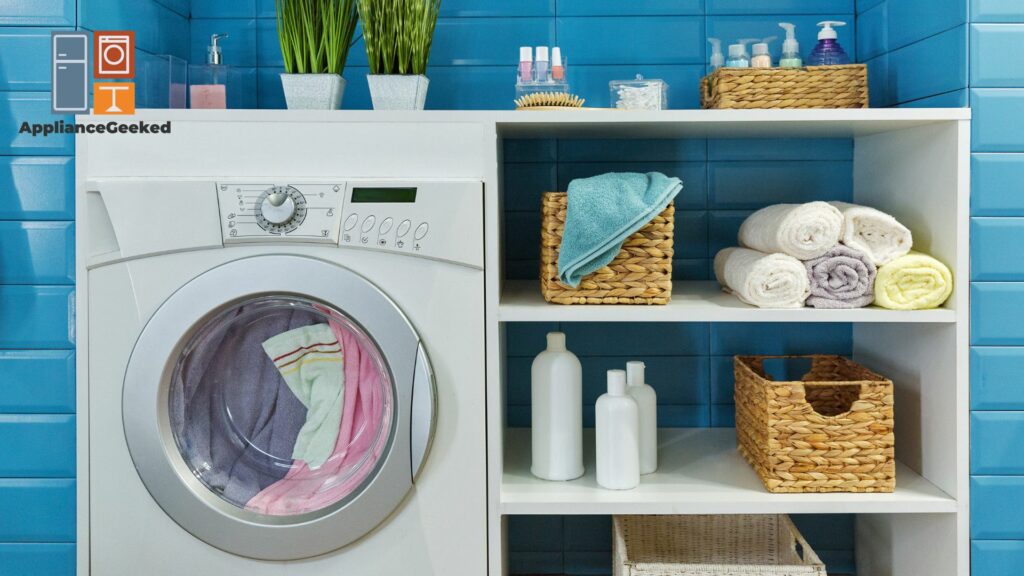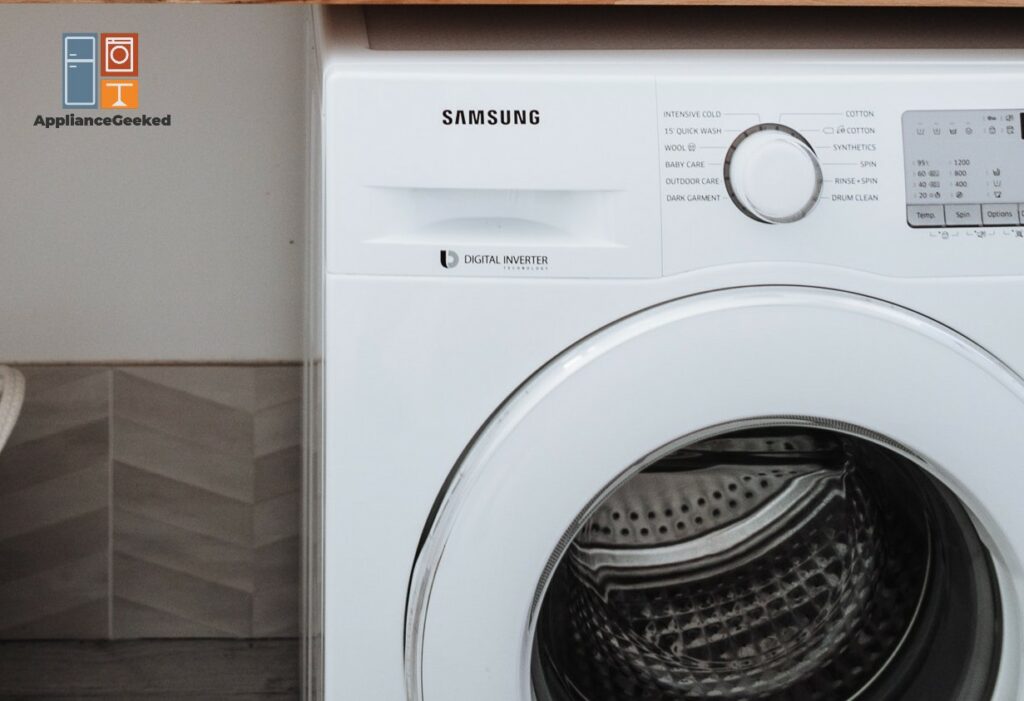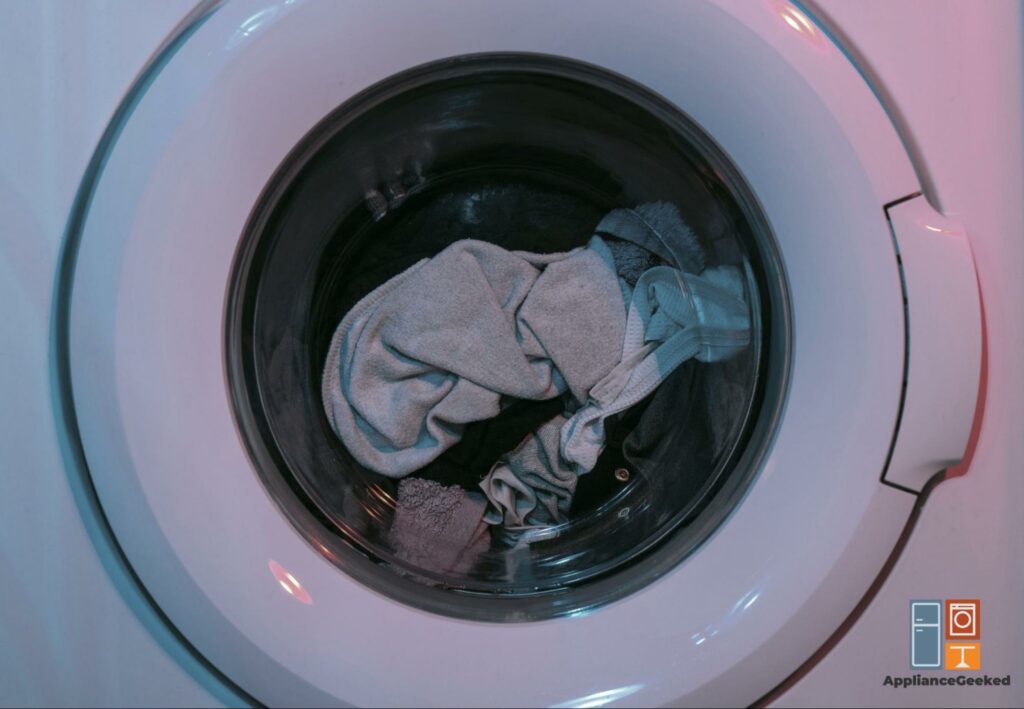Just when you think laundry day has been going smoothly, your Maytag washer screen suddenly flashes the F21 code towards the end of the cycle.
This unexpected turn is surely confusing and troublesome that we can’t help but wonder what’s going on and what went wrong! More importantly, how do we solve this problem?
If you’re looking for ways to deal with the F21 error code on your Maytag washer, then you’ve come to the right place. Learn what it means and its easy fixes!
What does the Maytag washer’s F21 code mean?
A Maytag washer’s F21 error code means that the machine is taking too long to drain. This could be caused by issues with your drain pump and drain hose.
When the washer takes more than 8 minutes to drain the water from its tub, the F21 code will show up.
Other signs that your washer has draining issues are if it stops mid-cycle, the door refuses to unlock, and it has lots of water inside the tub. Luckily, you can fix the error on your own!
Let’s identify its possible causes and their corresponding solutions.
Getting Rid of Maytag Washer’s F21 Error Code: Causes and Fixes

The F21 draining problem can be due to damaged drain pumps, a kinked drain hose, and even excessive suds. We’ll address each issue one by one.
| Causes | Solutions |
| Damaged drain pump | • Turn your washer off and unplug it from its power outlet. • Switch off your water supply source. • Reposition your washer with its back panel facing you. • Unfasten the screws of the back panel with a screwdriver. • Remove your washer’s back panel cover. • Locate the drain pump at the bottom left of your washer. Inspect it for any signs of damage. • If there are cracks on your drain pump, it needs to be replaced. • Purchase a new drain pump from Maytag’s store or at appliance centers. • To remove your old drain pump, see if there are pipe clamps securing the drain hose to the pump. • Unfasten the clamps using your pliers. • Get a basin or bucket and place it under the drain pump before removing the drain hose. • Once you have a basin underneath, detach the drain hose from the pump. • Expect the water inside the tub to pour out. • Wait until the washer’s tub is completely drained, then remove the clothes inside the tub if there are any. • Remove the black hose connected to the drain pump. • You may flip your washer to the side for better access. • Using your screwdriver, remove the screws of the drain pump to detach it from the washer. • Next, pull off the wire connected to the pump. • Set the old pump aside and get the new one for installation. • Connect your washer’s wire to the new drain pump. • Attach the black hose to the drain pump. • Using a screwdriver, put the screws of the drain pump to secure it in place. • Put the washer’s cover back and tighten its screws with your screwdriver. • Return the washer to its proper position. • Switch the water supply on and plug in your washer to its outlet. |
| Kinked or clogged drain hose | • Turn off your washer and unplug it from the power source. • Check the drain hose and see if it’s kinked, twisted, or trapped under another object. • If the hose is kinked or knotted, stretch and straighten it out. • If the hose is trapped, remove the object squishing it, and straighten the hose. • Keep the hose away from other objects that can snag it. • Next, check if the drain hose is clogged. • To do so, remove the washer’s back cover to access the drain hose. • Prepare a bucket for catching the remaining water inside the tub and the drain hose. • Once the tub and hose are drained, disconnect the hose from the washer. • Examine the hose’s interior and see if there are blockages. • Grab a long brush and thoroughly clean the inside of the hose. • Brush away any dirt, lint, or residue inside it. • Next, rinse the drain hose and check if water is now flowing freely through it. • Attach the drain hose to the washer. • Next, place the rear cover back and screw it on using your screwdriver. • Plug your washer back into the outlet. |
| Excessive suds | • Press the pause or stop button on your washer’s control panel. • Wait for up to 15 minutes for the suds inside the tub to mellow down. • Look for the rinse option on the control panel and press it. Then, press start. • Wait for your washer to finish the new rinse cycle. |
Now that we’ve seen the reasons behind your F21 error code, we have to agree that fixing the problem isn’t as complicated as we thought!
Here’s a thorough step-by-step breakdown of the repair processes to make things much easier to follow.
Damaged Drain Pump
The drain pump of your Maytag washer is in charge of sucking the water out from the tub so it would flow out the drain hose.
That’s why a damaged pump must be replaced. Otherwise, it wouldn’t be able to function properly and help your washer drain the water.
Solution: First, turn your washer off and unplug it from the power source to avoid electrocution during disassembly.
Next, switch off your water supply source to avoid messy water leaks.
Move your washer and reposition it with its back panel facing you. This will make the drain pump more accessible.
Get your screwdriver and unfasten the screws of your washer’s back panel. Remove the panel cover and set it aside.
Find the drain pump at the bottom left of your washer. It is a white plastic component with tubes or hoses attached to it.
Inspect the pump and see if there are cracks, scratches, and other signs of damage. If there are cracks in your drain pump, it’s time to purchase a new one and replace it.
You can get a new drain pump from Maytag’s store or at appliance centers.
To remove your old drain pump, check if pipe clamps are attached to the drain hose and the pump. Use your pliers to unfasten and loosen the clamps.
Next, prepare a basin or bucket and put it under the drain pump to catch the water that will drain from the tub.
Once you have a basin positioned, pull off the drain hose from the pump and let the water flow out until the tub is empty.
Wait until the washer’s tub is completely drained. If there are still clothes inside the tub, remove them.
Pull off the black plastic hose connected to the drain pump. If you’re having difficulty reaching it, carefully flip your washer to the side for better access.
Using your screwdriver, remove the screws on the drain pump and detach it from the washer. Next, pull off the wire connected to the pump.
With the old pump gone, get the one for installation.
Connect the wire to the drain pump and then attach the black hose to it.
Using your screwdriver, secure the drain pump in place with its screws. Place the washer’s cover back and screw it securely in place as well.
Move the washer back to its proper position. Turn on your water supply and plug your washer into its power source.
Kinked or Clogged Drain Hose
If the drain hose is kinked or if anything is clogging it, it’ll prevent the water from the washer’s tub from flowing and exiting freely.
This will slow down the draining time and will trigger the F21 error code.
Solution: Turn the washer off then disconnect it from the power source.
Check if the drain hose is kinked, twisted, or trapped under another object.
If you find the hose in an odd position that can compromise the flow of the water, stretch the hose out and straighten the folds.
If the hose is caught under a heavy object that’s blocking the waterway, remove the object squishing it, and straighten the folds.
Keep the hose away from other objects that can snag it. You can plate it neatly on a hook to keep it away from the floor.
Next, see if the drain hose is clogged. To do so, remove the washer’s back cover to access the drain hose.
Fetch a bucket, basin, or any deep container and place it underneath the spot where the drain hose is connected to the washer.
Detach the drain hose from the washer and let the water drain inside the tub drain into the prepared container.
After all the excess water is removed, detach the hose from the washer and examine the hose’s interior to see if there are blockages.
Using a long brush, thoroughly clean the inside of the hose. Brush away all the dirt, lint, or residue.
Rinse the drain hose and check if water is now flowing smoothly through it.
After cleaning the hose, attach it again to the washer. Put the washer’s rear cover back and screw it securely in place using your screwdriver.
Plug your washer into the power source.
Excessive Suds

It’s satisfying to see bubbles form inside the tub during a cycle because it leaves the impression that our clothes are being washed thoroughly.
However, too much sud build-up can also affect draining time. The thick foam of bubbles can hinder water flow, slowing it down enough for the F21 code to be triggered.
Solution: Stop the current cycle by pressing the pause or stop button on your washer’s control panel.
Wait for the suds inside the tub to mellow down. This can take 15 minutes or more.
Once the suds have decreased, search for the cycle setting on the control panel.
Set the washer into rinse mode by pressing the rinse button. Press start.
Wait for your washer to finish its new rinse cycle.
Quick Tip:
Using high-efficiency (HE) detergent can help you avoid excessive sud build-up. HE detergents produce less suds even at low water levels.
If your washer suddenly stops during a cycle and shows the F21 code, don’t let frustration wash over you. Remember that this problem has simple solutions you can do on your own.
More importantly, don’t hesitate to ask for help! Consulting professionals will help give you the confidence you need to overcome this challenge.




